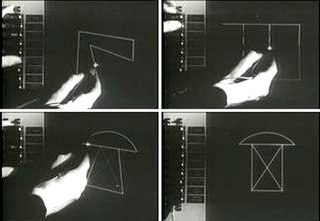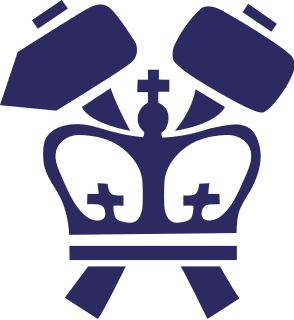
Sketchpad was a computer program written by Ivan Sutherland in 1963 in the course of his PhD thesis, for which he received the Turing Award in 1988, and the Kyoto Prize in 2012. It pioneered the way for human–computer interaction (HCI). Sketchpad is considered to be the ancestor of modern computer-aided design (CAD) programs as well as a major breakthrough in the development of computer graphics in general. For example, the graphical user interface (GUI) was derived from the Sketchpad as well as modern object oriented programming. Ivan Sutherland demonstrated with it that computer graphics could be used for both artistic and technical purposes in addition to showing a novel method of human-computer interaction.

The School of Computer Science (SCS) at Carnegie Mellon University in Pittsburgh, Pennsylvania, US is a leading private school for computer science established in 1988. It has been consistently ranked among the top computer science programs over the decades. U.S. News & World Report currently ranks the graduate program as tied for 1st with Massachusetts Institute of Technology, Stanford University, and University of California, Berkeley.
Doctor of Science, usually abbreviated Sc.D., D.Sc., S.D., or D.S., is an academic research degree awarded in a number of countries throughout the world. In some countries, "Doctor of Science" is the title used for the standard doctorate in the sciences; elsewhere the Sc.D. is a "higher doctorate" awarded in recognition of a substantial and sustained contribution to scientific knowledge beyond that required for a Doctor of Philosophy (PhD). It may also be awarded as an honorary degree.

National Institute of Technology Calicut, formerly Regional Engineering College Calicut, is an autonomous, federally funded technical university and an institute of national importance governed by the NIT Act passed by the Parliament of India. The campus is situated 22 kilometres (14 mi) north east of Kozhikode, on the Kozhikode–Mukkam Road. It was established in 1961 and was known as Calicut Regional Engineering College (CREC) until 2002. It is one of the National Institutes of Technology campuses established by the Government of India for imparting high standard technical education to students from all over the country. NIT Calicut hosts a supercomputer on its campus, and has a dedicated nanotechnology department.

The Fu Foundation School of Engineering and Applied Science is the engineering and applied science school of Columbia University. It was founded as the School of Mines in 1863 and then the School of Mines, Engineering and Chemistry before becoming the School of Engineering and Applied Science. On October 1, 1997, the school was renamed in honor of Chinese businessman Z.Y. Fu, who had donated $26 million to the school.

Cochin University of Science and Technology (CUSAT) is a government-owned autonomous science and technology university in Kochi, Kerala, India. It was founded in 1971 and has three campuses: two in Kochi, and one in Kuttanad, Alappuzha, 66 km (41 mi) inland. The university awards degrees in engineering and science at the undergraduate, postgraduate and doctoral levels.
Andrew Sears is an American computer scientist. He is Professor and Dean of the College of Information Sciences and Technology (IST) at The Pennsylvania State University.

The Human-Computer Interaction Institute (HCII) is a department within the School of Computer Science at Carnegie Mellon University (CMU) in Pittsburgh, Pennsylvania. It is considered one of the leading centers of human-computer interaction research, and was named one of the top ten most innovative schools in information technology by Computer World in 2008. For the past three decades, the institute has been the predominant publishing force at leading HCI venues, most notably ACM CHI, where it regularly contributes more than 10% of the papers. Research at the institute aims to understand and create technology that harmonizes with and improves human capabilities by integrating aspects of computer science, design, social science, and learning science.
The Gubkin Russian State University of Oil and Gas is a university in Moscow. The university was founded on 17 April 1930 and is named after the geologist Ivan Gubkin. The university is affectionally known as Kerosinka, meaning "kerosene stove".
Ronald Baecker is an Emeritus Professor of Computer Science and Bell Chair in Human-Computer Interaction at the University of Toronto. He was the co-founder of the Dynamic Graphics Project, and is the founder of the Knowledge Media Design Institute (KMDI) and the Technologies for Aging Gracefully Lab (TAGlab). He is the author of Computers and Society: Modern Perspectives, published by Oxford University Press in 2019.
The Professional Doctorate in Engineering (PDEng) is a Dutch degree awarded to graduates of a Technological Designer (engineering) program that develop their students' capabilities to work within a professional context. These programs focus on applied techniques and design, in their respective engineering fields. The technological PDEng designer programs were initiated at the request of the Dutch high-tech industry. High-tech companies need professionals who can design and develop complex new products and processes and offer innovative solutions. All programs work closely together with high-tech industry, offering trainees the opportunity to participate in large-scale, interdisciplinary design projects. With this cooperation, PDEng programs provide trainees a valuable network of contacts in industry. Each program covers a different technological field, for example managing complex architectural construction projects, designing mechanisms for user interfaces for consumer products or developing high-tech software systems for software-intensive systems. Participation in a program that awards the abbreviation PDEng requires at least a Master's degree in a related field. The PDEng may sometimes be confused with a PhD, but they are not comparable.
Andries Evert Brouwer is a Dutch mathematician and computer programmer, Professor Emeritus at Eindhoven University of Technology (TU/e). He is known as the creator of the greatly expanded 1984 to 1985 versions of the roguelike computer game Hack that formed the basis for NetHack. He is also a Linux kernel hacker. He is sometimes referred to by the handle aeb.

Theodore Aloysius Maria (Theo) Bemelmans is a Dutch computer scientist and Emeritus Professor of Administrative Information Systems and Automation at the Eindhoven University of Technology.
Antonius Cornelis Joannes (Ton) de Leeuw is a Dutch organizational theorist and Emeritus professor of business administration at the University of Groningen, known for his contributions in the field of systems theory and methodology applied to business administration, management and innovation.
Herman Bouma is a Dutch vision researcher and gerontechnologist. He is considered to be one of the founders of the field of gerontechnology. He spent the majority of his career at the Institute of Perception Research, serving as its director from the mid 1970s until 1994. He subsequently led the Institute for Gerontechnology until 1999.

Jacob O. Wobbrock is a Professor of Human-Computer Interaction in the Information School and, by courtesy, in the Paul G. Allen School of Computer Science & Engineering at the University of Washington. Prof. Wobbrock directs the ACE Lab and is a founding member of the DUB Group and the Master of Human-Computer Interaction & Design program.
Joëlle Coutaz is a French computer scientist, specializing in human-computer interaction (HCI). Her career includes research in the fields of operating systems and HCI, as well as being a professor at the University of Grenoble. Coutaz is considered a pioneer in HCI in France, and in 2007, she was awarded membership to SIGCHI. She was also involved in organizing CHI conferences and was a member on the editorial board of ACM Transactions on Computer-Human Interaction. She has authored over 130 publications, including two books, in the domain of human-computer interaction.
Lisa Anthony is an assistant professor in the Department of Computer & Information Science & Engineering (CISE) at the University of Florida. She is also the director of the Intelligent Natural Interaction Technology Laboratory. Her research interests revolve around developing natural user interfaces to allow for greater human-computer interaction, specifically for children as they develop their cognitive and physical abilities.








